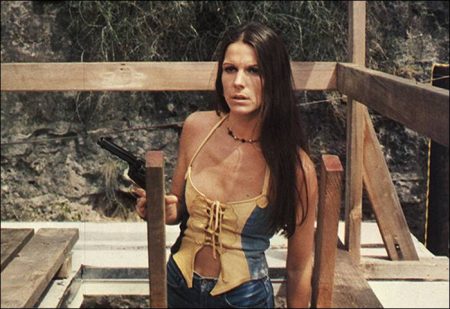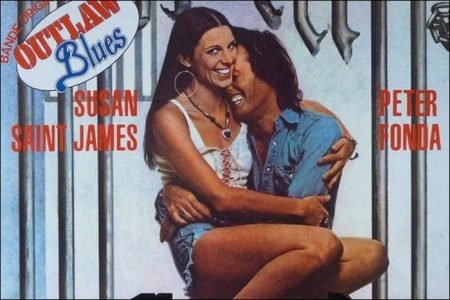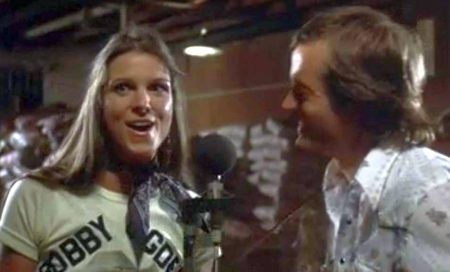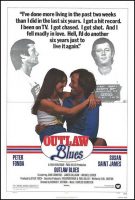Taglines: His song is a runaway hit while he’s a hit runaway.
Outlaw Blues movie storyline. Upon his imminent parole after serving six years in Huntsville Prison, Bobby Ogden hopes to carve out a career as a country music singer/songwriter. The prison’s associate warden believes Bobby has what it takes if he only gets the opportunity. With country music star Garland Dupree performing for the prisoners, the associate warden, as one of those opportunities, has Bobby perform one of his songs, Outlaw Blues, for Garland, even if it’s only for the concert’s sound check, hoping that Garland will help Bobby out when he’s paroled.
While Garland seems disinterested in Bobby’s performance, he actually was listening carefully as the world eventually not only hears Garland perform Outlaw Blues on the radio, but he has copyrighted the song claiming it as his own work. Once released, Bobby has to decide what to do about Garland stealing his song, knowing largely that it’s his word and that of a bunch of other convicts against that of a renowned country music star.
What happens between Bobby and Garland is affected by one of Garland’s backup singers, Tina Waters, who was at the sound check and who believes her ingenuity should be able to reap her some financial benefit, and by Austin Chief of Police Buzz Cavenaugh, a personal friend of Garland’s, Buzz who has to deal with the situation as it is ruining his chances in his run for Austin mayor.
Outlaw Blues is a 1977 American drama film directed by Richard T. Heffron and starring Peter Fonda and Susan Saint James. Written by Bill L. Norton, the film is about an ex-convict and songwriter trying to break into the music business in Austin, Texas. When a famous country singer steals one of his songs and turns it into a hit, the songwriter confronts him, and in a struggle the country singer accidentally shoots himself. Once again running from the law, the songwriter, with the help of a savvy backup singer, records his stolen song himself, and his version becomes an even bigger hit. Some of the songs were sung by Peter Fonda, and three of the songs were written by Hoyt Axton.

Film Review for Outlaw Blues
Like many junk foods, “Outlaw Blues,” which went on sale at neighborhood theaters yesterday, is pleasantly palatable it not especially nutritious. Despite its aura of contrivance, Peter Fonda and the rest of an energetic cast help transform these “Blues” into a fairly lighthearted adventure set against the background of the country-and-western music scene.
Of course, they make the most of a musical genre that has millions of devoted fans. Mr. Fonda makes his movie debut as a vocalist and guitarist, singing the title tune by John Oates, as well as other plaintive rural ditties by such country salwarts as Lee Clayton and Harlan sanders. But, to the credit of B. W. L. Norton’s script, the film also strongly indicates the vicious competition and sleaziness that could lurk behind the glamorous facades of some of the medium’s recording giants.Essentially, “Outlaw Blues” is a Mack Sennett-like chase with Mr. Fonda, as an ex-convict, in pursuit of James Callahan, playing the ruthless country star who has stolen Mr. Fonda’s titular ballad.
If our hero is a naive tyro at first, he is soon shown the light by Susan St. James, as a decorative tough cookie wise in the ways of this division of show business. As might be expected, sex and love get into the act.Richard T. Heffron, the director who has focused largely on documentaries, for example “Fillmore,” has kept his cast in fairly constant motion in such authentic locales as Huntsville (Ala.) Prison, San Antonio and Austin, Tex., where the chase is centered.
As noted, Miss St. James knows a good thing when she sees one, and, using a fracas in which the thieving star is accidentally shot, she proceeds to make a sought-after luminary out of her excon lover.If speeding cars and a speedboat are not particularly original action devices, they are colorful and occasionally funny as our fleeing principals and the police, headed by Buzz Cavanaugh (John Crawford), make their roaring, breakneck rounds through the city and its river.
Come to think of it, the athletic cast is broadly oafish or devious in proper tongue-in-cheek style; Peter Fonda manages to be gently appealing and has a pleasant tenor voice, while Miss St. James is convincing as an expert conniver as well as being flip and pretty. “I’ve got the last laugh on you,” Mr. Fonda’s “Outlaw” sings, which isn’t quite true considering his slight saga. But he and his company make it an amiable, lilting, if lightweight, diversion.Although the young fry are certainly accustomed to the type of violent speeding seen in “Outlaw Blues,” some raunchy dialogue probably earned it its PG (“Parental Guidance Suggested”) rating.
Outlaw Blues (1977)
Directed by: Richard T. Heffron
Starring: Peter Fonda, Susan Saint James, John Crawford, James T. Callahan, Michael Lerner, Steven Fromholz, Richard Lockmiller, Gene Rader, Jan Rita Cobler, Curtis Harris, Jerry Greene
Screenplay by: Bill L. Norton
Cinematography by: Jules Brenner
Film Editing by: Scott Conrad, Danford B. Greene
Costume Design by: Rosanna Norton
Art Direction by: Jack Marty
Music by: Charles Bernstein, Bruce Langhorne
MPAA Rating: None.
Distributed by: Warner Bros. Pictures
Release Date: August 15, 1977 (USA)
Views: 241


